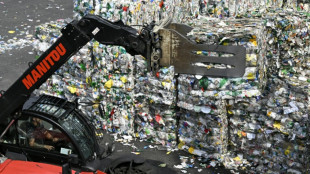
-
 Crypto firm accidentally sends $40 bn in bitcoin to users
Crypto firm accidentally sends $40 bn in bitcoin to users
-
Pistons end Knicks' NBA winning streak, Celtics edge Heat

-
 Funerals for victims of suicide blast at Islamabad mosque that killed at least 31
Funerals for victims of suicide blast at Islamabad mosque that killed at least 31
-
A tale of two villages: Cambodians lament Thailand's border gains

-
 Police identify suspect in disappearance of Australian boy
Police identify suspect in disappearance of Australian boy
-
Cuba adopts urgent measures to address energy crisis: minister

-
 Not-so-American football: the Super Bowl's overseas stars
Not-so-American football: the Super Bowl's overseas stars
-
Trump says US talks with Iran 'very good,' more negotiations expected

-
 Trump administration re-approves twice-banned pesticide
Trump administration re-approves twice-banned pesticide
-
Hisatsune leads Matsuyama at Phoenix Open as Scheffler makes cut

-
 Beyond the QBs: 5 Super Bowl players to watch
Beyond the QBs: 5 Super Bowl players to watch
-
Grass v artificial turf: Super Bowl players speak out

-
 Police warn Sydney protesters ahead of Israeli president's visit
Police warn Sydney protesters ahead of Israeli president's visit
-
Bolivia wants closer US ties, without alienating China: minister

-
 Ex-MLB outfielder Puig guilty in federal sports betting case
Ex-MLB outfielder Puig guilty in federal sports betting case
-
Milan-Cortina Winter Olympics open with dazzling ceremony

-
 China overturns death sentence for Canadian in drug case
China overturns death sentence for Canadian in drug case
-
Trump reinstates commercial fishing in protected Atlantic waters

-
 Man Utd can't rush manager choice: Carrick
Man Utd can't rush manager choice: Carrick
-
Leeds boost survival bid with win over relegation rivals Forest

-
 Stars, Clydesdales and an AI beef jostle for Super Bowl ad glory
Stars, Clydesdales and an AI beef jostle for Super Bowl ad glory
-
Dow surges above 50,000 for first time as US stocks regain mojo

-
 Freeski star Gu says injuries hit confidence as she targets Olympic treble
Freeski star Gu says injuries hit confidence as she targets Olympic treble
-
UK police search properties in Mandelson probe

-
 Bompastor extends contract as Chelsea Women's boss despite slump
Bompastor extends contract as Chelsea Women's boss despite slump
-
Milan-Cortina Winter Olympics open with glittering ceremony

-
 A French yoga teacher's 'hell' in a Venezuelan jail
A French yoga teacher's 'hell' in a Venezuelan jail
-
England's Underhill taking nothing for granted against Wales

-
 Fans cheer for absent Ronaldo as Saudi row deepens
Fans cheer for absent Ronaldo as Saudi row deepens
-
Violence-ridden Haiti in limbo as transitional council wraps up

-
 Hundreds protest in Milan ahead of Winter Olympics
Hundreds protest in Milan ahead of Winter Olympics
-
Suspect in murder of Colombian footballer Escobar killed in Mexico

-
 Colombia's Rodriguez signs with MLS Minnesota United
Colombia's Rodriguez signs with MLS Minnesota United
-
Wainwright says England game still 'huge occasion' despite Welsh woes

-
 WADA shrugs off USA withholding dues
WADA shrugs off USA withholding dues
-
France detects Russia-linked Epstein smear attempt against Macron

-
 Winter Olympics to open with star-studded ceremony
Winter Olympics to open with star-studded ceremony
-
Trump posts, then deletes, racist clip of Obamas as monkeys

-
 Danone expands recall of infant formula batches in Europe
Danone expands recall of infant formula batches in Europe
-
Trump deletes racist video post of Obamas as monkeys

-
 Colombia's Rodriguez signs with MLS side Minnesota United
Colombia's Rodriguez signs with MLS side Minnesota United
-
UK police probing Mandelson after Epstein revelations search properties

-
 Russian drone hits Ukrainian animal shelter
Russian drone hits Ukrainian animal shelter
-
US says new nuclear deal should include China, accuses Beijing of secret tests

-
 French cycling hope Seixas dreaming of Tour de France debut
French cycling hope Seixas dreaming of Tour de France debut
-
France detects Russia-linked Epstein smear attempt against Macron: govt source

-
 EU nations back chemical recycling for plastic bottles
EU nations back chemical recycling for plastic bottles
-
Terror at Friday prayers: witnesses describe blast rocking Islamabad mosque

-
 Iran expects more US talks after 'positive atmosphere' in Oman
Iran expects more US talks after 'positive atmosphere' in Oman
-
US says 'key participant' in 2012 attack on Benghazi mission arrested


Burning question: what can we expect in a 1.5C world?
Massive wildfires exposing millions to toxic smoke, drought shrivelling crops and key waterways, destructive storms supercharged by record ocean temperatures -- in the last year the world has had a taste of what to expect with warming of 1.5C.
For the first time on record, Earth has endured 12 consecutive months of temperatures 1.5 degrees Celsius hotter than the pre-industrial era, Europe's climate monitor said Thursday.
That does not signal a breach of the more ambitious limit agreed by countries in the 2015 Paris Agreement -- because that is measured as an average over two decades.
Temperatures since the middle of last year have been ramped up by the naturally-occurring El Nino warming event, which is likely to recede in the coming months.
But underlying planetary heating has cranked up the global thermometer, driven largely by the burning of fossil fuels as well as deforestation and agriculture.
"Although this news does not mean the Paris limit is exceeded, it is undeniably bad news," said Joeri Rogelj, director of research at the Grantham Institute, Imperial College London.
"Unless global emissions are urgently brought down to zero, the world will soon fly past the safety limits set out in the Paris climate agreement."
- Limits of endurance -
That 1.5C milestone is no longer in the distant future, with the UN's IPCC climate science panel warning that a breach is likely sometime between 2030 and 2035.
What would a 1.5C world mean for humans and the natural world they rely on to survive?
Scientists estimate current global temperatures are around 1.2C hotter overall than the pre-industrial benchmark, averaged across the period 1850 to 1900.
Severe climate impacts are already visible around the world and would be amplified once the 1.5C threshold is reached.
Some parts of the world, like the Arctic and high mountain areas, are warming far faster than others.
In other regions, even small temperature increases can expose vulnerable communities to dangerous threats, including heat that tests the very limit of human endurance.
Coral reefs -- ecosystems that provide habitat for an immense array of marine life and protect coastlines -- are projected to decline 70 to 90 percent in a world that has warmed 1.5C.
The loss of biodiversity globally will be among the most pronounced impacts of a 1.5C warmer climate, according to the IPCC.
- Over the line -
Climate experts are also concerned that accelerating permafrost thaw will release carbon dioxide and methane into the atmosphere, creating a vicious cycle of warming.
The IPCC currently classifies the risk of permafrost melt in some regions as "moderate", but it would become "high" in a 1.5C or even warmer climate.
Some impacts of warming are already irreversible, and will continue to worsen, like sea level rise, driven by melting ice sheets and glaciers.
Higher ocean levels are already threatening the future of low-lying islands, while in the longer term metres of sea level rise will likely swamp many of the world's major coastal cities.
Even if the 1.5C limit is breached, reducing greenhouse gas emissions remains crucial to stay "well below" 2C of warming, the maximum warming limit set by the Paris Agreement.
That is because "every increment of global warming will intensify multiple and concurrent hazards," the IPCC warns.
Halting deforestation and the rampant destruction of ecosystems are also crucial to maintain nature's ability to drawn down carbon from the atmosphere.
Oceans absorb 90 percent of the excess heat produced by the carbon pollution from human activity since the dawn of the industrial age.
T.Khatib--SF-PST

